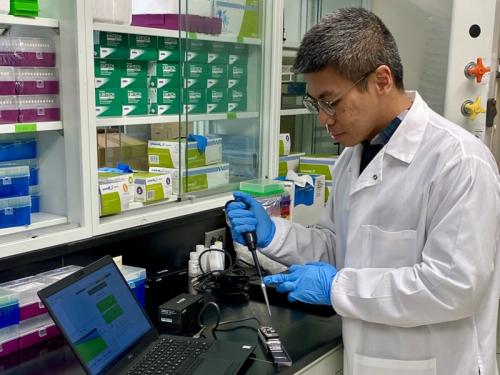Tiong Aw — A Scholar of Public Health & Water

How can the smallest organisms have such a big impact on our daily lives? How can we ensure that these organisms don’t hurt us? Tiong Aw, a self-proclaimed “microbes detective,” has dedicated his life to answering these questions, acquiring a diverse set of skills along the way, from environmental engineering to virology. Aw is an associate professor at Tulane’s School of Public Health and Tropical Medicine and a ByWater Institute fellow, and his work bridges the gap between engineering and health-related microbiology.
Born and raised in Malaysia, Aw has been drawn to engineering, chemistry, and biology for as long as he can remember. To combine his interests, he studied engineering and environmental engineering at the University of Technology (UTM) in Malaysia, focusing on water-related infrastructure. After graduating from UTM, he worked as an environmental engineer, participating in the design of wastewater treatment facilities. However, his interest shifted from managing these systems to studying the microorganisms they monitored.
For his Ph.D., Aw moved to Singapore to study microbiology at Nanyang Technological University. While retaining his interest in wastewater systems, his dissertation focused on Singapore’s water reuse system, exploring how its treatment facilities managed viruses and potential public health risks. Singapore, facing challenges with limited natural resources and surrounded by seawater, necessitated innovative approaches, such as rainwater collection, to meet water demands.
“I was fascinated by how these tiny creatures, invisible to the naked eye, could have such a significant impact on human health,” Aw remarked.
Aw’s research field is relatively new. Previously, public health and environmental studies primarily focused on chemical contaminants and hazardous waste. Traditionally, testing water for microorganisms involved laborious cell culture methods in the lab. However, advancements in molecular biology now enable scientists to detect genetic material in water, akin to finding a fingerprint that leads detectives to their suspects. Techniques like PCR allow for the amplification of specific genetic material, making it easier to detect microorganisms in water.
“My research also focuses on advancing new analytical methods or technologies for studying and monitoring microbial pathogens in the environment,” Aw added.
One significant advancement was Aw’s work on SARS-CoV-2 at Tulane University. Amid the 2020 coronavirus pandemic, Aw, serving as a tenure-track associate professor in Tulane’s Department of Environmental Health Sciences, explored the feasibility of using wastewater to monitor virus spread. While not entirely new, Aw’s research spurred interest nationwide and prompted engineers to design systems for measuring infection rates. His paper, titled “First detection of SARS-CoV-2 RNA in wastewater in North America: A study in Louisiana, USA,” published in 2020, has been cited 358 times, indicating its impact.
“I enjoyed this work because I could see its practical application in informing policy and creating systems to promote public health,” Aw remarked.
Following his 2020 success, Aw expanded his research on virus detection in wastewater. In 2021, he received $1.24 million from the EPA to develop more efficient testing methods and collaborate with engineers to design systems to eradicate viruses. This endeavor aims to validate purification treatments and establish standards for future water reuse infrastructure. Aw is partnering with five water reclamation facilities across California, Florida, and Ohio, in addition to testing water in New Orleans.
“I straddle engineering and health-related microbiology, bridging these areas to work at the intersection of different disciplines,” Aw noted.
Aw’s collaboration with the ByWater Institute delves into another interdisciplinary intersection: the relationship between water quality, public health, and climate change in coastal areas. His proposed project seeks to integrate human health and ecosystem research by addressing water quality issues in Louisiana’s coastal restoration efforts. The ultimate goal is to enhance research capacity in investigating connections between water quality, public health, and ecosystem resilience, particularly concerning harmful algal blooms.
Eventually, Aw aims to organize a workshop gathering multidisciplinary scientists to address the integration of water-health nexus research in coastal Louisiana. This workshop’s objective is to develop a collaborative grant proposal focusing on environmental health problems associated with harmful algal blooms, emerging pathogens, climate change, and water and food safety in the Gulf Coast region.
“I believe active participation from various stakeholders, including state agencies, is crucial. In Louisiana, water agencies often prioritize water quantity, but I aim to shift our focus towards water quality,” Aw emphasized.
